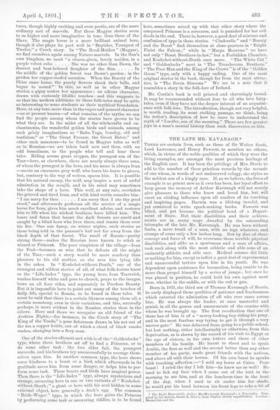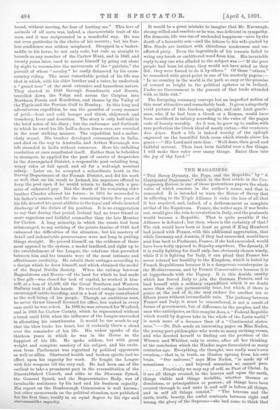THE LATE MR. KAVANAGH.* THERE are certain lives, such as
those of Sir Walter Scott, Lord Lawrence, and Henry Fawcett, to mention no others,. which, in virtue of the noble qualities of which they were the living examples, are amongst the most precious heritage of the English race. It has been the privilege of Mrs. Steele to
add to the number of these priceless records by the memoir of one whom, in words of not undeserved eulogy, she styles as. the noblest son of a kingly race. If, as we believe, the force of example is as potent now as it ever has been, her loyal effort to. keep green the memory of Arthur Kavanagh will not merely give pleasure to those who knew and loved him, but will exert an abiding influence upon all readers of its touching. and inspiring pages. Darwin was a lifelong invalid, and yet contrived to write epoch-making books. Fawcett was blind, and yet became the political head of a Depart- ment of State. But their disabilities and their achieve- ments are in ninny ways dwarfed by the astounding: triumphs of the late Mr. Kavanagh. He was born without limbs, a mere trunk of a man, with no legs whatever, and stumps of arms only a few inches long. But by dint of sheer courage and force of will, he overcame these terrible physical disabilities, and alike as a sportsman and a man of affairs, took rank along with the most athletic and able sons of an eminently athletic and able race. Medical science did little or nothing for him, except to inflict a good deal of experimental and unsuccessful torture upon him in his youth. He was dependent upon assistance for locomotion, being unable to do- more than propel himself by a series of jumps ; but once he was placed in position, he could hold his own against most men, whether in the saddle, or with the rod or gun.
Born in 1831, the third son of Thomas Kavanagh of Borris, he early displayed those qualities of patience and fearlessness which extorted the admiration of all who ever came across him. He was always the leader, at once masterful and genial, in all the games and amusements of the cousins with whom he was brought up. The first recollection that one of these has of him is of a "merry-looking boy riding his pony, and in the most fearless way trying to get it through a very narrow gate." He was debarred from going to a public school,. but lost nothing, either intellectually or otherwise, from this. deprivation, as is shown by the record of his visit to Egypt at the age of sixteen, in his own letters and those of other members of his family. He learnt to shoot and to speak Arabic, the first as well and the second better than any other member of his party, made great friends with the natives,. and above all with their horses. Of his own beast be speaks with touching affection :—" I sold my horse at Cairo. Poor beast ! I cried the day I left him—he knew me so well ! He used to lick my face when I came out of the tent in the morning to see him, and at the luncheon-time in the heat of the day, when I used to sit under him for shade, he would put his head between his front legs to take a bit of
* The Right Honourable Arthur MacIdurrough Kavanagh a Biography. Com- piled by his Cousin, Sarah L. Stee'e, from Papers chiefly unpublished. London: Macmillan and Co.
bread, without moving, for fear of hurting me." This love of animals of all sorts was, indeed, a characteristic trait of the man, and it was reciprocated in a wonderful way. He was not even particular in the choice of his mounts ; but his fear- less confidence was seldom misplaced. Strapped in a basket- -saddle to his horse, he not only rode, but rode as straight to bounds as any member of the Carlow Hunt, and in 1848, and twenty years later, used to amuse himself by going out alone by night to reconnoitre the movements of the "patriots," the pursuit of whose " cavalry " he easily distanced by his cross- -country riding. The most remarkable period of his life was that in which, with his elder brother and a tutor, he undertook
"grand tour" of the most extensive and hazardous nature. They started in 1849 through Scandinavia and Russia, travelled down the Volga and across the Caspian into Northern Persia and Kurdistan, and thence by the Valley of the Tigris and the Persian Gulf to Bombay. In this long and adventurous expedition, he ran the gauntlet of every manner of peril,—beat and cold, hunger and thirst, shipwreck and treachery, fever and desertion. The story is only half-told in the brief notes of his diary ; but the endurance and fortitude to which be owed his life halff-a-dozen times over, are revealed in the most striking manner. The expedition had a melan- choly sequel. His brother developed consumption in India, and died on the way to Australia, and Arthur Kavanagh was left stranded in India without resources. Here his unfailing resolution at once manifested itself. Rather than be beholden to strangers, he applied for the post of carrier of despatches in the Aurungabad District, a responsible post entailing long, weary rides at full speed, and all for a well-nigh nominal salary. Later on, he accepted a subordinate berth in the Survey Department of the Poonah District, and did his work Sc) well, that on his recall to Ireland, his superiors offered to keep the post open if he would return to India, with a pro- mise of enhanced pay. But the death of his remaining elder brother Charles altered his future : in 1854 he succeeded to his father's estates, and for the remaining thirty-five years of his life devoted his great abilities to the loyal and whole-hearted discharge of the duties of his position. It is no exaggeration to say that during that period Ireland had no truer friend or more sagacious and faithful counsellor than the late Member for Carlow. A long minority, in which the estate had been mismanaged, to say nothing of the potato famine of 1848, bad enhanced the difficulties of the situation ; but his mastery of detail and indomitable perseverance were not long in putting things straight. He proved himself, on the evidence of those most opposed to the system, a model landlord, and right up to the establishment of the League, the relations that prevailed between him and his tenants were of the most intimate and affectionate cordiality. He rebuilt their cottages according to a design which he drew himself, and which obtained the medal of the Royal Dublin Society. When the railway between Bagnalstown and Borris,—of the land for which be had made a free gift—was closed for lack of capital, he worked it him- self, at a loss of £5,000, till the Great Southern and Western Railway took it off his hands. Be revived cottage industries, encouraged cattle-breeding, and in a host of ways contributed to the well-being of his people. Though an ambitious man, he never thrust himself forward for office, but waited in every case until he was asked. In 1866 be was returned for Wexford, and in 1868 for Carlow County, which he represented without a break until 1880, when the influence of the League succeeded in alienating his constituents, It would be too much to say that the blow broke his heart, but it certainly threw a cloud .over the remainder of his life. His widow speaks of the thirteen years in which he was in the House as the happiest of his life. He spoke seldom, but with great weight and complete mastery of his subject, and his exclu- sion from Parliament was regretted by political opponents as well as allies. Shattered health and broken spirits had no -effect upon his capacity for work. He fought the League with fair weapons till the very end. He had been one of the earliest to take a prominent part in the reconstitution of the Disestablished Church, and alike in the Diocesan Synod, the General Synod, and the Representative Body, was of invaluable assistance by his tact and his business capacity. His report on the Bessborough Commission is well known ; but other memoranda on the political situation, now published for the first time, testify in an equal degree to his ripe and statesmanlike sagacity.
It would be a great mistake to imagine that Mr. Kavanagh, strong-willed and resolute as he was, was deficient in sympathy. His domestic life was one of unclouded happiness—save by the death of a favourite son—and the letters to his wife quoted by Mrs. Steele are instinct with chivalrous tenderness and un- affected piety. Even the ingratitude of Ibis tenants failed to wring any harsh or embittered word from him. His invariable reply to any one who alluded to the subject was :—" If the poor people had been let alone, they would not have acted as they did : they were forced to do it by others." Of those "others," he remarked with great point in one of his masterly papers ,— "In no country in the world is the path so easy or the promise of reward so bright to the political agitator as in Ireland. Under no Government is the pursuit of that trade attended with so little risk."
The foregoing summary conveys but an imperfect notion of this most attractive and remarkable book. It gives a singularly vivid picture of this fearless, upright, and able Irish gentle- man, who, if he had been a Greek or a Roman, would have been sacrificed in infancy according to the rules of the pagan code of beauty-worship. As it was, he grew up to realise with rare perfection the Greek ideal of manly virtue,—the Ter pAyropoc abgv Ora/. Such a life is indeed worthy of the epitaph engraved on the beautiful Irish cross which stands above his grave :—" His Lord said unto him : Well done, thou good and faithful servant. Thou haat been faithful over a ftw things. I will make thee ruler over many things. Enter thou into the joy of thy Lord.'"







































 Previous page
Previous page